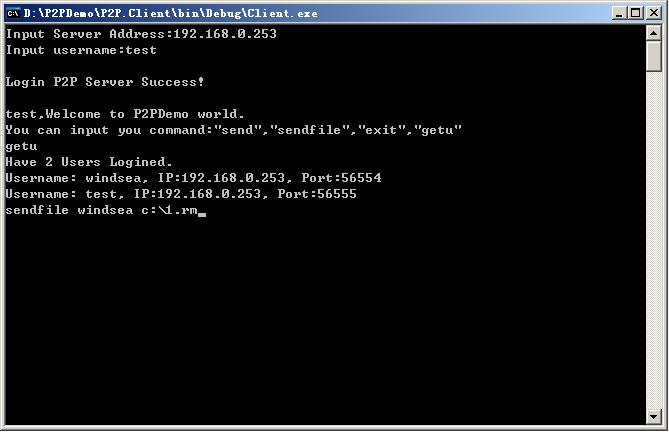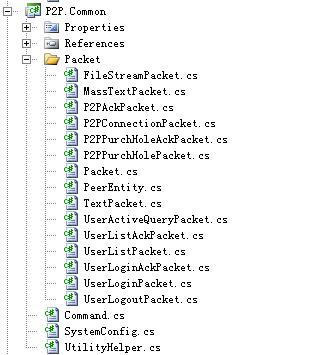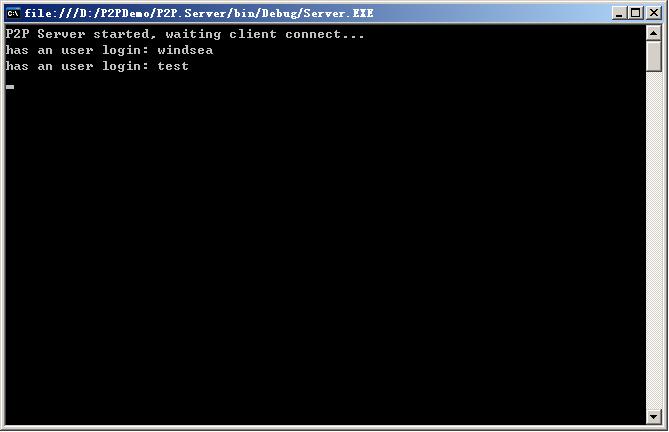转载:http://www.cnblogs.com/dudu/archive/2009/03/26/1422677.html
在网上看了很多程序(QQ、Azureus、Ants、PPStream)都实现了p2p,以前觉得技术很高深。通过这段时间的学习才发现,单纯的实现 p2p在局域网通讯很容易,但是要实现外网穿透(NAT)感觉很困难。最近看了Azureus和emule源码,分别是JAVA和C++版,本人对这两门 语言都不熟悉,看起来很吃力。最后只好根据VC++实现的P2PDemo程序进行了改版,根据设计思路用C#写了一个Demo出来。通过测试,多个客户端 在局域网能脱离服务端实现端到端工作。外网的情况要通过路由器,看了Azureus要实现uPnp进行端口映射,在CodeProject上下载了一个 uPnp源码看,测试结果没有启用uPnp路由器。结果现在郁闷了,不知道下一步怎么测试,是不是用upnp实现了端口自动映射成功就能实现象QQ那样通 讯。
下面是程序说明:
1、公共类
公共类主要定义一些包结构
a、Packet.cs
[Serializable()]
public abstract class Packet
{
/// <summary>
/// 命令类型
/// </summary>
/// <returns></returns>
public virtual int GetCommandType()
{
return –1;
}
/// <summary>
/// 用户名
/// </summary>
public string UserName
{
get;
set;
}
public Packet()
{ }
public Packet(string username)
{
this.UserName = username;
}
}
b、MassTextPacket.cs –分片传输类
[Serializable()]
public class MassTextPacket:TextPacket
{
private int seqID;
/// <summary>
/// 包序列
/// </summary>
public int SeqID
{
get { return seqID; }
set { seqID = value; }
}
private int seqCount;
/// <summary>
/// 包数量
/// </summary>
public int SeqCount
{
get { return seqCount; }
set { seqCount = value; }
}
private int _CLSD;
public int CLSD
{
get { return _CLSD; }
set { _CLSD = value; }
}
}
2、客户端
a、消息传送时进行p2p通讯
private bool SendMessageTo(string toUserName, Packet packet)
{
PeerEntity toUser = userList.Single(c => c.UserName == toUserName);
if (toUser == null)
{
return false;
}
ReceivedACK = false;
for (int i=0; i<MAXRETRY; i++)
{
// 如果对方P2P地址不为0,就试图以它为目的地址发送数据,
// 如果发送失败,则认为此P2P地址无效
if (toUser.P2PAddress != null && toUser.P2PAddress.Port != 0)
{
if (packet.GetType() == typeof(TextPacket))
{
TextPacket msgPacket = new TextPacket(toUserName, (packet as TextPacket).Message);
byte[] buffer = UtilityHelper.Serialize(msgPacket);
if (buffer.Length > MAXBUFFERSIZE)
{
MassTextPacket mtp = new MassTextPacket();
mtp.SeqID = 0;
mtp.SeqCount = (int)System.Math.Ceiling(buffer.Length / (decimal)MAXBUFFERSIZE);
mtp.CLSD = mtp.GetHashCode();
long pos = 0;
long count = buffer.Length < MAXBUFFERSIZE ? buffer.Length : MAXBUFFERSIZE;
while (pos < buffer.Length && pos > 0)
{
byte[] bytes = new byte[count]; ;
for (int k = 0; k < count; k++)
bytes[k] = buffer[pos + k];
//数据组包
mtp.SeqID = mtp.SeqID + 1;
mtp.Message = Convert.ToBase64String(bytes);
//发送数据
byte[] buf = UtilityHelper.Serialize(mtp);
client.Send(buf, buf.Length, toUser.P2PAddress);
Thread.Sleep(100);
}
}
else
client.Send(buffer, buffer.Length, toUser.P2PAddress);
}
else if (packet.GetType() == typeof(FileStreamPacket))
{
FileStreamPacket fsp = packet as FileStreamPacket;
System.IO.FileStream fs = new System.IO.FileStream(fsp.FileName, System.IO.FileMode.Open, System.IO.FileAccess.Read, FileShare.Read);
handle1.Reset();
fsp.SeqID = 0;
fsp.SeqCount = (int)System.Math.Ceiling(fs.Length / (decimal)MAXBUFFERSIZE);
fsp.CLSD = fsp.GetHashCode();
long pos = 0;
long count = fs.Length < MAXBUFFERSIZE ? fs.Length : MAXBUFFERSIZE;
while (pos < fs.Length && count > 0)
{
byte[] buffer = new byte[count];
fs.Seek(pos, SeekOrigin.Begin);
fs.Read(buffer, 0, (int)count);
pos += count;
count = pos + MAXBUFFERSIZE < fs.Length ? MAXBUFFERSIZE : fs.Length – pos;
//数据组包
fsp.SeqID = fsp.SeqID + 1;
fsp.Message = Convert.ToBase64String(buffer);
//发送数据
byte[] buf = UtilityHelper.Serialize(fsp);
client.Send(buf, buf.Length, toUser.P2PAddress);
Thread.Sleep(300);
}
handle1.Set();
}
// 等待接收线程将标记修改
for (int j = 0; j < 10; j++)
{
if (this.ReceivedACK)
{
this.ReceivedACK = false;
return true;
}
else
{
Thread.Sleep(300);
}
}
}
// 构建P2P打洞封包
// 然后通过服务器转发,请求对方向自己打洞
P2PConnectionPacket transMsg = new P2PConnectionPacket(UserName, toUserName);
byte[] msgBuffer = UtilityHelper.Serialize(transMsg);
client.Send(msgBuffer, msgBuffer.Length, hostPoint);
// 等待对方的P2PCONNECTACK消息
for(int j = 0; j < 10; ++j)
{
toUser = userList.Single(c => c.UserName == toUserName);
if ( toUser.P2PAddress != null && toUser.P2PAddress.Port != 0)
break;
Thread.Sleep(300);
}
}
return false;
}
b、消息接受线程
/// <summary>
/// 接受线程处理
/// </summary>
private void RecvThreadProc()
{
byte[] buffer;
while (true)
{
buffer = client.Receive(ref remotePoint);
Packet packet = UtilityHelper.Deserialize(buffer) as Packet;
Type msgType = packet.GetType();
if (msgType == typeof(UserListAckPacket))
{
// 转换消息
UserListAckPacket usersMsg = (UserListAckPacket)packet;
// 更新用户列表
userList.Clear();
foreach (PeerEntity user in usersMsg.Users)
{
userList.Add(user);
}
bUserListComplete = true;
}
else if (msgType == typeof(UserLoginAckPacket))
{
ProcUserLogAckMsg(packet);
}
else if (msgType == typeof(TextPacket))
{
// 转换消息
TextPacket txtPacket = (TextPacket)packet;
printf("Receive a message: {0}", txtPacket.Message);
// 发送应答消息
P2PAckPacket ackMsg = new P2PAckPacket();
buffer = UtilityHelper.Serialize(ackMsg);
client.Send(buffer, buffer.Length, remotePoint);
}
else if (msgType == typeof(MassTextPacket))
{
lock (this)
{
MassTextPacket fPacket = (MassTextPacket)packet;
if (packets.ContainsKey(fPacket.CLSD))
packets[fPacket.CLSD].Add(fPacket);
else
packets.Add(fPacket.CLSD, new List<MassTextPacket>() { fPacket });
printf("PacketID:{0}–SeqNo:{1}–progress:{2}%", fPacket.CLSD, fPacket.SeqID, (int)(System.Math.Round(packets[fPacket.CLSD].Count / (decimal)(fPacket as MassTextPacket).SeqCount, 2) * 100));
//组包
if ((fPacket as MassTextPacket).SeqCount == packets[fPacket.CLSD].Count)
{
List<MassTextPacket> temp = packets[fPacket.CLSD].OrderBy(c => c.SeqID).ToList();
List<byte> values = new List<byte>();
foreach (MassTextPacket mt in temp)
{
byte[] buf = Convert.FromBase64String(mt.Message);
values.AddRange(buf);
}
MassTextPacket value = UtilityHelper.Deserialize(values.ToArray()) as MassTextPacket;
printf("Receive a message: {0}", value.Message);
// 发送应答消息
P2PAckPacket ackMsg = new P2PAckPacket();
buffer = UtilityHelper.Serialize(ackMsg);
client.Send(buffer, buffer.Length, remotePoint);
}
}
}
else if (msgType == typeof(FileStreamPacket))
{
lock (this)
{
FileStreamPacket fPacket = (FileStreamPacket)packet;
if (packets.ContainsKey(fPacket.CLSD))
packets[fPacket.CLSD].Add(fPacket);
else
packets.Add(fPacket.CLSD, new List<MassTextPacket>() { fPacket });
printf("PacketID:{0}–SeqNo:{1}–progress:{2}%", fPacket.CLSD, fPacket.SeqID, (int)(System.Math.Round(packets[fPacket.CLSD].Count / (decimal)(fPacket as FileStreamPacket).SeqCount, 2) * 100));
//组包
if ((fPacket as FileStreamPacket).SeqCount == packets[fPacket.CLSD].Count)
{
List<MassTextPacket> temp = packets[fPacket.CLSD].OrderBy(c => c.SeqID).ToList();
System.IO.FileStream fs = new System.IO.FileStream((fPacket as FileStreamPacket).FileName + ".tmp", System.IO.FileMode.Create, System.IO.FileAccess.ReadWrite);
foreach (FileStreamPacket mt in temp)
{
byte[] buf = Convert.FromBase64String(mt.Message);
fs.Write(buf, 0, buf.Length);
}
fs.Flush();
fs.Close();
printf("Receive a file: {0}", (fPacket as FileStreamPacket).FileName);
//清除数据包
packets[fPacket.CLSD].Clear();
// 发送应答消息
P2PAckPacket ackMsg = new P2PAckPacket();
buffer = UtilityHelper.Serialize(ackMsg);
client.Send(buffer, buffer.Length, remotePoint);
}
}
}
else if (msgType == typeof(P2PAckPacket))
{
this.ReceivedACK = true;
}
else if (msgType == typeof(P2PPurchHolePacket))
{
ProcP2PPurchHoleMsg(packet, remotePoint);
}
else if (msgType == typeof(P2PPurchHoleAckPacket))
{
PeerEntity touser = userList.SingleOrDefault(c => c.UserName == (packet as P2PPurchHoleAckPacket).ToUserName);
//更改本地的P2P连接时使用的IP地址
touser.P2PAddress = touser.RemoteEndPoint;
}
Thread.Sleep(100);
}
}
c.建立p2p会话
private void ProcP2PPurchHoleMsg(Packet packet,IPEndPoint remoteEP)
{
//打洞请求消息
P2PPurchHolePacket purchReqMsg = (P2PPurchHolePacket)packet;
PeerEntity toUser = userList.Single(c => c.UserName == purchReqMsg.ToUserName);
PeerEntity user = userList.Single(c => c.UserName == purchReqMsg.UserName);
toUser.P2PAddress = toUser.RemoteEndPoint;
printf("Set P2P Address for {0}->[{1}]", user.UserName, toUser.P2PAddress.ToString());
//uPnp实现端口映射
if(NAT.AddPortMapping(toUser.P2PAddress.Port, ProtocolType.Udp, "AddPortMapping"))
printf("Port mapping successed!");
// 发送打洞消息到远程主机
P2PPurchHoleAckPacket trashMsg = new P2PPurchHoleAckPacket(purchReqMsg.UserName, purchReqMsg.ToUserName);
byte[] buffer = UtilityHelper.Serialize(trashMsg);
client.Send(buffer, buffer.Length, user.RemoteEndPoint);
}
3、服务端
a、消息处理线程
private void RecvThreadProc()
{
IPEndPoint remotePoint = null;
byte[] msgBuffer = null;
while (true)
{
msgBuffer = server.Receive(ref remotePoint);
try
{
object msgObj = UtilityHelper.Deserialize(msgBuffer);
switch ((msgObj as Packet).GetCommandType())
{
case Command.MSG_USERLOGIN: //用户登录
ProcUserLoginMsg(msgObj as UserLoginPacket, remotePoint);
break;
case Command.MSG_USERLOGOUT: //退出登录
ProcUserLogoutMsg(msgObj as UserLogoutPacket, remotePoint);
break;
case Command.MSG_GETUSERLIST: //所有用户列表
ProcGetUserListMsg(msgObj as UserListPacket, remotePoint);
break;
case Command.MSG_P2PCONNECT: //点对点连接信息
ProcP2PConnectMsg(msgObj as P2PConnectionPacket, remotePoint);
break;
case Command.MSG_USERACTIVEQUERY: // 用户对服务器轮询的应答
ProcUserActiveQueryMsg(msgObj as UserActiveQueryPacket, remotePoint);
break;
}
Thread.Sleep(100);
}
catch { }
}
}
b、服务端请求客户端建立p2p连接
private void ProcP2PConnectMsg(Packet packet,IPEndPoint remoteEP)
{
// 转换接受的消息
P2PConnectionPacket transMsg = (P2PConnectionPacket)packet;
printf("{0}({1}) wants to p2p {2}", remoteEP.Address.ToString(), transMsg.UserName, transMsg.ToUserName);
// 获取目标用户
PeerEntity toUser = userList.SingleOrDefault(c => c.UserName == transMsg.ToUserName);
// 转发Purch Hole请求消息
P2PPurchHolePacket transMsg2 = new P2PPurchHolePacket(transMsg.UserName, toUser.UserName);
//转发消息
byte[] buffer = UtilityHelper.Serialize(transMsg2);
server.Send(buffer, buffer.Length, toUser.RemoteEndPoint);
}
4、测试
a、服务端
b、客户端

困惑:
1、能不能实现外网通讯,要实现像QQ那样通讯要做哪些改进。
2、文件续传如何实现。
3、C#封装的网络操作类(像QQ.NET源码的Net实现)
4、远程协助的实现。
最后,希望大家共同讨论、共同进步!!!
 Mikel
Mikel




